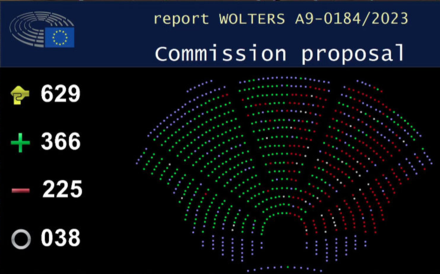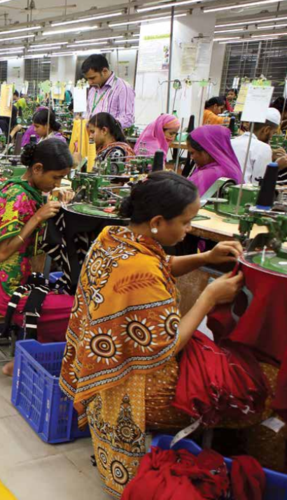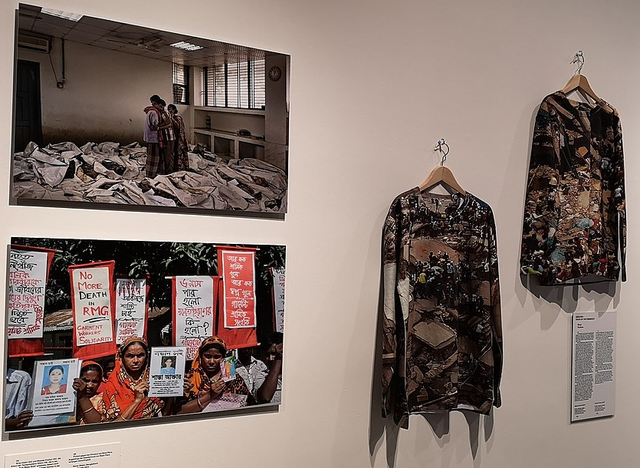The Rana Plaza disaster happened 10 years ago on 24 April 2013 in Bangladesh, killing over 1000 textile workers. The European Parliament remembered the victims and discussed a Commission proposal aiming to make EU big corporations accountable for their suppliers on environmental and workers’ issues. Conservative MEPs were divided during the debate.
-
The Rana Plaza disaster in Bangladesh happened 10 years ago on 24 April 2013. It was a multi-storey building that housed textile factories and shops, located in Savar, a town about 25 km northwest of the capital of Bangladesh, Dhaka. A day before the disaster, on 23 April 2013, cracks had been detected in the building, whose access therefore had been barred by the local police. Nevertheless, the textile workers of the place, mostly women, were forced by their companies to go working and toil the next day in the unsafe factory building.
The very next day, on 24 April, the construction collapsed, killing 1,135 people and injuring another 2,438. To this day, the Rana Plaza disaster is considered the largest factory accident in Bangladesh. As a result, international pressure was exerted on Bangladeshi political leaders. This led to some improvements in the protection of workers.
31 May 2023 ► Double debate on the Rana Plaza disaster and the EU Supply Chain Directive in the European Parliament
During its monthly plenary session on 31 May 2023 in Brussels, the European Parliament (EP) scheduled a one-hour debate about “the 10th anniversary of the Rana Plaza Collapse in Bangladesh” to commemorate the disaster’s victims.
MEPs from all political groups took the floor. The speakers consistently condemned the lax political regulations that led to the collapse. Some MEPs highlighted the fact that the protection rules for workers in Bangladesh had improved over the last 10 years, even if they still left much to be desired.
MEPs from the left groups in the EP pointed out that Bangladeshi textile companies produce cheap textiles also for the European market. Therefore, European textile chains should be considered co-responsible for the working conditions in the production countries, as the pressure on costs by European customers is usually at the expense of the working conditions of the workers in the production countries.
Several MEPs also made an explicit connection to the following debate about the EU Supply Chain Directive, calling for support for the negotiated compromise on this directive, which the conservative EPP group intended in part to reject. This directive, they argued, would serve to prevent such avoidable catastrophes as the Rana Plaza disaster in the future. The vote itself on the directive by the assembly was scheduled for the next day (1 June 2023).
The debate on the EU Supply Chain Directive that started immediately after the recollection of the Rana Plaza disaster very quickly revealed the fractures within the EP when it comes to drawing practical-political consequences from a disaster like the one in Bangladesh.

The EP’s agenda on the directive (Source: Europarliamentary Research Service).The Left, the Greens, the Social Democrats and the Liberals supported the directive. The two far-right groups in the EP rejected the text and announced that they would vote against it the next day.
MEP Axel Voss (CDU, Germany) spoke for the European People’s Party (EPP) and explained that, from his point of view, the negotiated compromise would not meet all the demands put forward by the EPP. Nevertheless, he advocated the approval of the directive proposal by his group, especially since the compromise negotiations with the Council of the European Union, i.e. the governments of the EU member states, were still pending. But while Voss was trying to reach a compromise, the chairman of the German CDU/CSU group in the EU Parliament, Daniel Caspary, told the media that the EP compromise could not be approved from the point of view of the conservative group, as it went beyond the German supply chain law (cf. taz of 31 May 2023: “New EU rules for supply chains: Conservatives make cuts in the law”).
Also the Left Group in the EP is not satisfied with all aspects of the compromise. MEP Helmut Scholz (The Left), spokesman on trade policy for his group, had published on the same day a press release (in German only) on the official website of his group (“Credibility instead of hypocrisy – Left in EP for effective supply chain directive”), in which he declares: “As the Left we have called for better protection for victims. Outsiders have no insight into internal company processes. In the event of disputes companies therefore should prove that they actually fulfilled their due diligence obligations towards suppliers. We would have liked the directive to be more ambitious on this point.” Nevertheless, his group decided to approve the directive, as it represents a clear improvement over the current situation.
The directive’s background
The EU Corporate Sustainability Due Diligence Directive (nicknamed “the supply chain directive”) would ensure that victims of human rights violations or environmental damage can turn to European civil courts to enforce their rights. European companies woud have then to prove that their suppliers respect human and workers’ rights as well.
The draft directive was presented by the EU Commission on 23 February 2022. The member states’ Ministries of Economic Affairs fixed their position on 1 December 2022. Before the directive enters into force, Parliament and the Council will have to reach a compromise. The aim is to adopt the directive before the European elections.
The EU Supply Chain Directive is not a direct response to the Rana Plaza disaster. There have been indeed efforts at UN level for a long time to force companies to respect human rights and environmental rights. However, the disaster has certainly reminded the European institutions of the importance of this project and thus accelerated the whole process.
In 2014, at the initiative of the countries of Ecuador and South Africa, the UN Human Rights Council established an intergovernmental working group tasked with drafting a binding international agreement “on transnational corporations with respect to human rights”, a still ongoing process. The EU Directive has taken up the UN Human Rights Council’s concerns, making them legally binding for companies based in the EU.
1 June 2023 ► The EP’s vote of the directive

Source: EP rapporteur on the proposal Lara Wolters (S&D, Netherlands) via europa.blogOn Thursday, 1 June 2023, the EP voted by a clear majority in favour of the EP’s internal compromise. Of the 629 MEPs present, 366 voted in favour of the directive, 225 against and 38 abstained or were not in the Chamber at the time of the vote.
This vote now clears the way for the trilogue, i.e. the negotiations between the EP and the EU Council with the participation of the EU Commission to reach a provisional agreement on the finalised text to come.
Anyone who seriously wants to prevent disasters, such as those in Bangladesh 10 years ago, must make European companies accountable. And those who, as conservative MEPs, indulge in talks about European values, must be evaluated by how they take position when it comes to implementing these values through concrete rules for protecting people and nature as the very basis of our living.
This article was first published in German on the europa.blog website.
References & Further Reading
ILO: “Rana Plaza Two Years On: Progress made & challenges ahead for the Bangladesh RMG sector”, 28-page Report, International Labour Organization (ILO), April 2015.
Briefing Paper (EP) summarising stakes, content, and procedure: “Corporate sustainability due diligence”, European Parliament Briefing Paper on the directive, PE 729.424, European Parliamentary Research Service, May 2023.

Directive Commission proposal, EP amendments, EP vote results: the official EUR-Lex page with original text (all EU languages, in full) of the Commission proposal (2019/1937 – COM/2022/71 final); all the European Parliament amendments clearly presented as proposed to the vote on 1 June 2023. There are besides the EP session reports on the vote of the amendments 1) by parliamentary group and 2) by amendment (session protocol pp 52-71 and vote results pp.5-10).
United Nations (UNHCR): “Open-ended intergovernmental working group on transnational corporations and other business enterprises with respect to human rights”, UN Human Rights Council’s page on the advancement of the elaboration of “an international legally binding instrument to regulate, in international human rights law, the activities of transnational corporations and other business entreprises.” (UNHRC / “IGWG on TNCs”, created in 2014, still active). See a chronological synthesis of the working group’s internal political debates written by Humanrights.ch (in German): Humanright – Wirtschaft und Menschenrechte: UNO-Arbeitsgruppe zur Schaffung eines internationalen Abkommens. — OECD: There are also repeated references to OECD’s Responsible Business Conduct Standards in the EU Commission proposal (on this point, see Helmut Scholtz’ cited press release above).
2018’s and 2021’s EU resolutions: 2018 / A former 2018 debate initiated by the European Parliament following the UNHRC working group’s developments was followed by a (successful yet non-binding) “motion for a resolution on the EU’s input to a UN Binding Instrument on transnational corporations (…) with respect to human rights” (B8-0474/2018/REV). — 2021 / “European Parliament resolution of 10 March 2021 with recommendations to the Commission on corporate due diligence and corporate accountabilty”. (non-binding, yet also led to the Commission’s presently discussed proposal)
German and French recent laws on the corporate responsibility vis-à-vis their supply chains (frequently cited in debates): see “Corporate due diligence in supply chains on human rights and environmental laws” for Germany (“Lieferkettensorgfaltspflichtengesetz” 16 July 2021) — and Vigilance Act in France (“Loi sur le devoir de vigilance” 27 March 2017); you can find practical comparisons between the two on some major law firm websites.

Exhibition Fast Fashion: The Dark Sides of Fashion, Museum of European Cultures, Berlin 2019. [Sources: Medical College Hospital, Dhaka / medea7 Wikicommons (CC3.0)].
EXHIBITED PHOTOS:
[top left]
A Rana Plaza victim’s parents, 5 May 2013;
[top right]
Protest against Rana Plaza Collapse by relatives of the victims 24 October 2013.